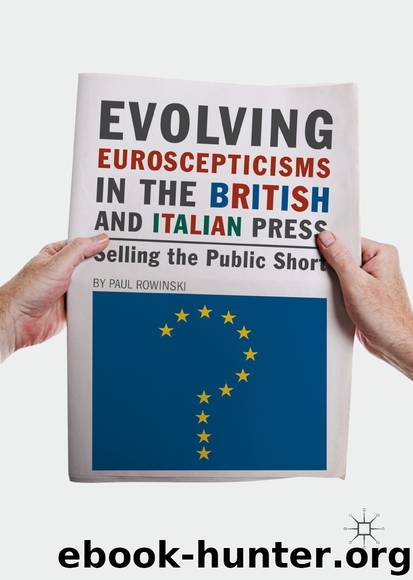Evolving Euroscepticisms in the British and Italian Press by Paul Rowinski

Author:Paul Rowinski
Language: eng
Format: epub
Publisher: Springer International Publishing, Cham
Corazza was initially referring to the sensibility in Britain over the name constitution. Oberhuber and Krzyżanowski (2007: 1) note at the outset of 2001 how the highly contested c-word was formally placed on the EU ’s political agenda. One of the critics was Britain. Corazza then goes on to raise the possibility of Britain leaving the Community. Corazza did not critique the EU Constitution. However, what Corazza also articulated was again the mobilising (Hutchinson 2006) of Britain as peripheral and a threat to Europe (and Italy within it) and again an Other within. On both levels this is implicit, but again a scheme of perception is reinforced.
Cazaninni suggested the EU Constitution had not gone far enough, but alluded to completely different elements to those discussed by Castellina. Cazaninni said: ‘Europe is at the moment in which it is trying to unify itself, constitutionally at a time of great fragility and civil crisis, really.’ She added that the only thing that was certain was nobody had envisaged the nationalistic and regionalistic responses that were a threat to the EU Constitution. Cazaninni concurred with Castellina over the failure of the EU Constitution, on a normative level, to translate to the operational level understood by citizens.
The position of both Cazaninni and Castellina, as part of the Euro-Communist subculture (Hallin and Mancini 2004), has to be considered. They perceived the particularism and anti-immigration of the Berlusconi governments (Giordano 2004: 69; Ter Wal 2002: 157–176) as a threat . The internal struggles within the Italian national habitus are thus rendered more visible (Wodak 2006).
Scafuri was caught between several conflicting positions over the EU Constitution. He stressed the institutional culture of Il Giornale, which he deemed quite critical of Europe (more so than his personal position, on the left of Italian politics). He understood the opposition of sections of the Italian left to the proposed EU Constitution and argued it was ‘well founded’ to critique the EU Constitution for focusing too heavily on the economy. Scafuri also criticised the EU Constitution for being ‘full of minute articles’ demonstrating a ‘Eurocratic’ approach. He said that the bent bananas syndrome of the British press was often cited in Italian newspapers, because it was felt the Commission was far too bureaucratic. Trenz (2007: 99) in his study notes that Commission-bashing was prevalent in various EU countries. Scafuri was encouraged to write for his right-wing newspaper, offering the counterweight of his position on the left. This is in complete contrast with the professionalism, which Hallin and Mancini (2004) note, in the British press, where left-leaning journalists take pride in their professionalism in conveying the position of the right held by the majority of British newspapers.
While it cannot be claimed that this sample was representative, the interviewees (except for Corazza, in preserving his distance as part of the EC) revealed a critical approach to the EU Constitution, transcending different fields—because it was insufficiently substantive. This is indicative at least of how the Italian left was critical of an EU Constitution focusing
Download
This site does not store any files on its server. We only index and link to content provided by other sites. Please contact the content providers to delete copyright contents if any and email us, we'll remove relevant links or contents immediately.
| Anthropology | Archaeology |
| Philosophy | Politics & Government |
| Social Sciences | Sociology |
| Women's Studies |
The Secret History by Donna Tartt(19003)
The Social Justice Warrior Handbook by Lisa De Pasquale(12177)
Thirteen Reasons Why by Jay Asher(8874)
This Is How You Lose Her by Junot Diaz(6857)
Weapons of Math Destruction by Cathy O'Neil(6249)
Zero to One by Peter Thiel(5768)
Beartown by Fredrik Backman(5719)
The Myth of the Strong Leader by Archie Brown(5482)
The Fire Next Time by James Baldwin(5409)
How Democracies Die by Steven Levitsky & Daniel Ziblatt(5200)
Promise Me, Dad by Joe Biden(5132)
Stone's Rules by Roger Stone(5066)
A Higher Loyalty: Truth, Lies, and Leadership by James Comey(4939)
100 Deadly Skills by Clint Emerson(4901)
Rise and Kill First by Ronen Bergman(4761)
Secrecy World by Jake Bernstein(4727)
The David Icke Guide to the Global Conspiracy (and how to end it) by David Icke(4685)
The Farm by Tom Rob Smith(4489)
The Doomsday Machine by Daniel Ellsberg(4474)
